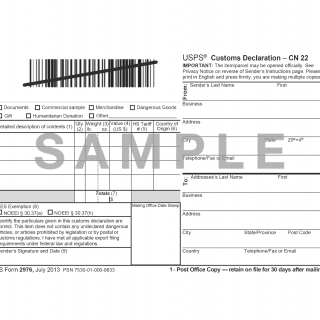PS Form 2976. Customs Declaration CN 22
PS Form 2976, also known as Customs Declaration CN 22, is a form used by the United States Postal Service (USPS) to declare the contents and value of international packages. The main purpose of this form is to provide customs officials with information about the package's contents and to ensure that the package is cleared through customs.
The form consists of several parts, including the sender's and recipient's information, a description of the contents, and the declared value of the package. Important fields to consider when filling out the form include the package's weight, the contents' description, and the value of the contents.
When filling out the form, data such as the sender's and recipient's full names and addresses, the package's weight, and the contents' description and value will be required. Additionally, documents such as a commercial invoice or packing list may need to be attached.
The parties involved in this form are the sender, recipient, and customs officials responsible for processing the package. Application examples and use cases for the PS Form 2976 include international shipping of goods, gifts, and personal effects.
Strengths of this form include its ability to provide customs officials with accurate information about the package's contents, which can help to prevent delays or issues with clearing customs. However, weaknesses may include the potential for errors in filling out the form, which can result in delays or additional fees.
Alternative forms or analogues to the PS Form 2976 may include the Customs Declaration CN 23, which is used for larger or more valuable packages. The main difference between these forms is the amount of information required and the size of the package.
The form affects the future of the participants by ensuring that the package is cleared through customs and delivered to the recipient. It is important to ensure that the form is filled out accurately and all necessary documents are attached.
The PS Form 2976 can be submitted to the USPS or to customs officials responsible for processing the package. It is typically stored with the package and customs officials. Notarization is not required for this form.

